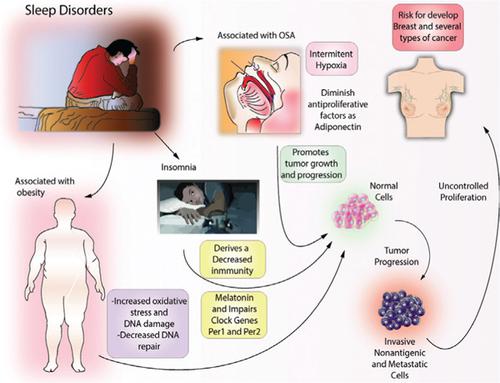当前位置:
X-MOL 学术
›
Curr. Genomics
›
论文详情
Our official English website, www.x-mol.net, welcomes your
feedback! (Note: you will need to create a separate account there.)
The Association of Sleep Disorders, Obesity, and Sleep-Related Hypoxia with Cancer.
Current Genomics ( IF 1.8 ) Pub Date : 2020-09-16 , DOI: 10.2174/1389202921999200403151720 Anna Brzecka 1 , Karolina Sarul 1 , Tomasz Dyła 1 , Marco Avila-Rodriguez 1 , Ricardo Cabezas-Perez 1 , Vladimir N Chubarev 1 , Nina N Minyaeva 1 , Sergey G Klochkov 1 , Margarita E Neganova 1 , Liudmila M Mikhaleva 1 , Siva G Somasundaram 1 , Cecil E Kirkland 1 , Vadim V Tarasov 1 , Gjumrakch Aliev 1
Current Genomics ( IF 1.8 ) Pub Date : 2020-09-16 , DOI: 10.2174/1389202921999200403151720 Anna Brzecka 1 , Karolina Sarul 1 , Tomasz Dyła 1 , Marco Avila-Rodriguez 1 , Ricardo Cabezas-Perez 1 , Vladimir N Chubarev 1 , Nina N Minyaeva 1 , Sergey G Klochkov 1 , Margarita E Neganova 1 , Liudmila M Mikhaleva 1 , Siva G Somasundaram 1 , Cecil E Kirkland 1 , Vadim V Tarasov 1 , Gjumrakch Aliev 1
Affiliation

|
Background
Sleep disorders have emerged as potential cancer risk factors. Objective
This review discusses the relationships between sleep, obesity, and breathing disorders with concomitant risks of developing cancer. Results
Sleep disorders result in abnormal expression of clock genes, decreased immunity, and melatonin release disruption. Therefore, these disorders may contribute to cancer development. Moreover, in sleep breathing disorder, which is frequently experienced by obese persons, the sufferer experiences intermittent hypoxia that may stimulate cancer cell proliferation. Discussion
During short- or long- duration sleep, sleep-wake rhythm disruption may occur. Insomnia and obstructive sleep apnea increase cancer risks. In short sleepers, an increased risk of stomach cancer, esophageal squamous cell cancer, and breast cancer was observed. Among long sleepers (>9 hours), the risk of some hematologic malignancies is elevated. Conclusion
Several factors including insomnia, circadian disruption, obesity, and intermittent hypoxia in obstructive sleep apnea are contributing risk factors for increased risk of several types of cancers. However, further studies are needed to determine the more significant of these risk factors and their interactions.
中文翻译:

睡眠障碍、肥胖和睡眠相关缺氧与癌症的关联。
背景 睡眠障碍已成为潜在的癌症危险因素。目的 本综述讨论睡眠、肥胖和呼吸障碍与伴随的癌症风险之间的关系。结果 睡眠障碍会导致时钟基因表达异常、免疫力下降和褪黑激素释放中断。因此,这些疾病可能会导致癌症的发生。此外,在肥胖者经常出现的睡眠呼吸障碍中,患者会经历间歇性缺氧,这可能会刺激癌细胞增殖。讨论 在短期或长期睡眠期间,可能会发生睡眠-觉醒节律紊乱。失眠和阻塞性睡眠呼吸暂停会增加癌症风险。研究发现,睡眠时间短的人患胃癌、食道鳞状细胞癌和乳腺癌的风险增加。睡眠时间长(>9 小时)的人患某些血液系统恶性肿瘤的风险较高。结论 失眠、昼夜节律紊乱、肥胖和阻塞性睡眠呼吸暂停间歇性缺氧等多种因素是导致多种癌症风险增加的危险因素。然而,需要进一步的研究来确定这些风险因素中更重要的因素及其相互作用。
更新日期:2020-09-16
中文翻译:

睡眠障碍、肥胖和睡眠相关缺氧与癌症的关联。
背景 睡眠障碍已成为潜在的癌症危险因素。目的 本综述讨论睡眠、肥胖和呼吸障碍与伴随的癌症风险之间的关系。结果 睡眠障碍会导致时钟基因表达异常、免疫力下降和褪黑激素释放中断。因此,这些疾病可能会导致癌症的发生。此外,在肥胖者经常出现的睡眠呼吸障碍中,患者会经历间歇性缺氧,这可能会刺激癌细胞增殖。讨论 在短期或长期睡眠期间,可能会发生睡眠-觉醒节律紊乱。失眠和阻塞性睡眠呼吸暂停会增加癌症风险。研究发现,睡眠时间短的人患胃癌、食道鳞状细胞癌和乳腺癌的风险增加。睡眠时间长(>9 小时)的人患某些血液系统恶性肿瘤的风险较高。结论 失眠、昼夜节律紊乱、肥胖和阻塞性睡眠呼吸暂停间歇性缺氧等多种因素是导致多种癌症风险增加的危险因素。然而,需要进一步的研究来确定这些风险因素中更重要的因素及其相互作用。











































 京公网安备 11010802027423号
京公网安备 11010802027423号